Why Use a Bitcoin API?
Bitcoin APIs work as a bridge between a specific software and the BTC network, enabling you to access and exchange crypto data through standardized endpoints. However, they are not the only means to it.
Instead of implementing an API, you can run a full node, use Web3 libraries for contract interactions, or write your client software from scratch using a cryptocurrency’s protocol documentation. So, why go for an Application Programming Interface instead?
For a broader opinion, I asked the rest of our development team at Abstract API. Our pick of the key benefits of using a Bitcoin API is:
- Access to real-time data. With a specialized crypto API, you can stream or request up-to-date information on transactions, blocks, and market prices, without having to parse raw data or maintain peer connections.
- Task automation. APIs let you automate iterative tasks such as tracking transactions or address activity, generating reports, and handling wallets. This reduces the error margin and streamlines the app’s management.
- Seamless integration. BTC APIs simplify the integration of Bitcoin functionality into an app. You can plug in modular Bitcoin features quickly, instead of running full nodes or building complex infrastructure to access them.
- Reduced complexity. Well-documented endpoints help lower the barrier to entry for developers new to Bitcoin infrastructure. They simplify UTXOs, raw transactions, cryptographic signatures, and consensus rules, streamlining Blockchain interactions.
- Time and resources saving. With an API, you don’t have to build and maintain your own Bitcoin structure. This helps you lower significantly development and management costs, relying on robust third-party infrastructure and governance.
Briefly, within the fast-moving crypto environment, APIs are more than just technical conveniences. They directly impact your app’s performance and profitability, as they can determine scalability, time-to-market, and troubleshooting speed, among others. Choosing the right one is, therefore, no small thing.
Key Features to Look for in a Bitcoin API
Cryptocurrency APIs shot up like mushrooms just a couple of years ago, and continue to thrive today. Finding the one that best suits your needs can seem as challenging as looking for a needle in a haystack. However, if you want to give it a try, these are the features you should look for:
- Data accuracy. Ensure that the API provides trustworthy data from reputable sources, as misreports and discrepancies can lead to performance failures and even money losses.
- Real-time updates. Low-latency data delivery may damage the user experience and reduce data accuracy. Check that the API delivers real-time data via WebSockets or low-latency REST endpoints.
- Comprehensive data coverage. APIs that provide access to a wide range of BTC data are easier to build and scale, as you don’t need to resort to secondary data sources. Look for APIs that offer:
- Blocks and transaction data.
- Address-level activity & wallet balances.
- Market prices & fee estimates.
- Exchange rates.
- Unspent outputs (UTXOs).
- Webhooks or event streams.
- Mempool depth.
- Scalability. Choose a Bitcoin API that can handle large numbers of requests to ensure consistent performance in case your app takes off or if you need to process high volumes of data. You can also look for APIs with scalable infrastructures or tiered plans.
- Security mechanisms. If your app will handle sensitive data, strong security is mandatory. Select APIs with endpoints shielded by authentication protocols (API keys, OAuth, etc.), IP whitelisting, rate limiting, among other measures.
- Reliability & high uptime. Make sure that the software of your choice has proven, high uptime records (if possible, 99 % or more). Especially if your app requires a real-time interface and reliable data delivery.
- Ease of use. Go for clean, well-documented APIs, simple to integrate, and easy to adopt. This will help you cut development costs and reduce time-to-market and debugging time.
- Pricing. The best cryptocurrency APIs offer competitive, scalable pricing structures and flexible plans to let your app grow without sudden jumps in costs or hidden rate limits.
- Support. An API's reliability doesn’t end with uptime, but also involves strong customer support. Read user reviews to check if the API team offers timely responses and actionable solutions.
These features impact the overall efficiency, maintainability, and trustworthiness of your app, while also supporting its growth and potential adjustments. Therefore, take your time when choosing a Bitcoin API… Or jump to the next section, where you’ll find a breakdown of top-tier software, curated by Abstract API’s team.
Top Bitcoin APIs: A Comparison
At Abstract, we know that quality APIs make the difference. Through extensive research, trial, and error, we selected 8 of the best cryptocurrency APIs available that you can use for your Bitcoin projects.
Ready to meet your perfect match?
1. Binance API
One of the biggest names in crypto trading and APIs is Binance. This network offers REST and WebSocket APIs to exchange market and user data, handle trade orders, and manage wallets.
Binance data accurately matches market activity, as it’s directly sourced from Binance U.S. order books and trade feeds, and has an uptime of 99.97 %.
Its REST API offers millisecond-level snapshots with data on BTC, ETH, and other stablecoins. You can use its WebSocket Endpoints for live streams. However, streaming delays have been reported historically.
Keep in mind that in the U.S., you can only use Binance.us, which lists fewer trading pairs and solely supports spot trading. Also, the documentation can be quite dense and difficult to parse, adding some complexity to the API integration.
Binance API is free to use and integrate. It uses a weighted rate-limiting system, designed for high-volume trading. One IP can issue up to 10 orders/sec or the equivalent of 1200-6000 weight/minute. Trading fees are applied following the Binance.us standard schedule.
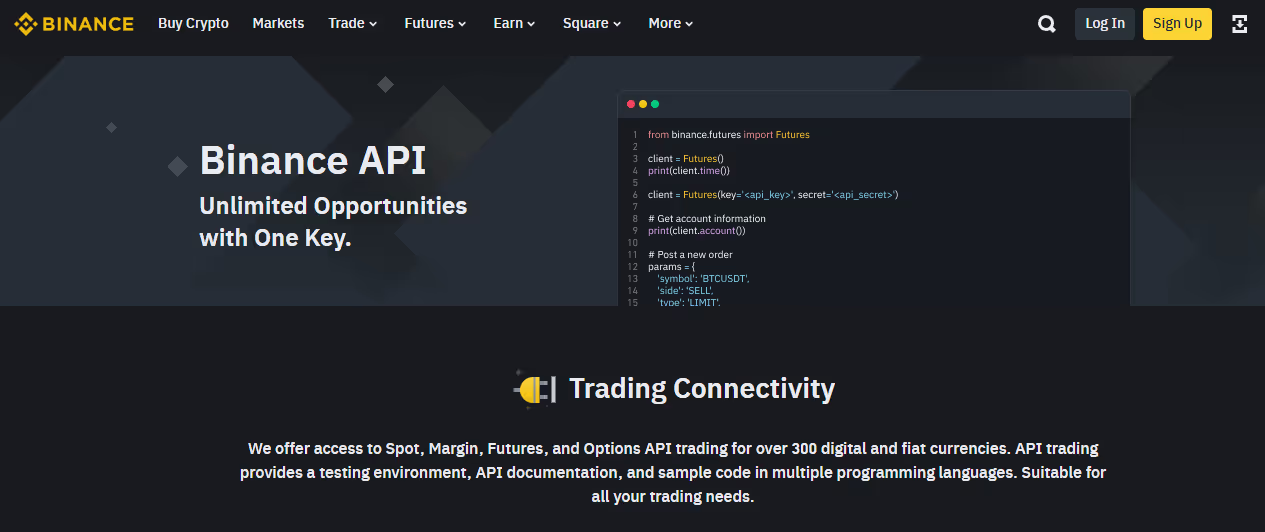
2. CoinGecko API
CoinGecko is a cryptocurrency data API in operation since 2014. It specializes in providing real-time and historical data for over 17,000+ cryptocurrencies, including Bitcoin. CoinGecko combines market data, trading pairs, metadata, NFT collection floor prices, and on-chain DEX data.
The perks of this API? It’s user-friendly documentation and enterprise-grade SLA with 99.9% uptime. On the other hand, the data is generally reliable, but some historical edge-case discrepancies have been occasionally reported.
This network has a free demo plan, with a call rate of 30/min, and 10,000/mo. Paid plans offer higher rate limits and access to more than 60 market data endpoints. Pricing starts at 129 USD/mo for 500k call credits. This Bitcoin API also has a customizable Enterprise plan for advanced needs.
CoinGecko features endpoints for live prices and historical data of most cryptocurrency categories, tracking more than 8M tokens and liquidity pools across 200 blockchain networks, decentralized exchanges, and marketplaces.
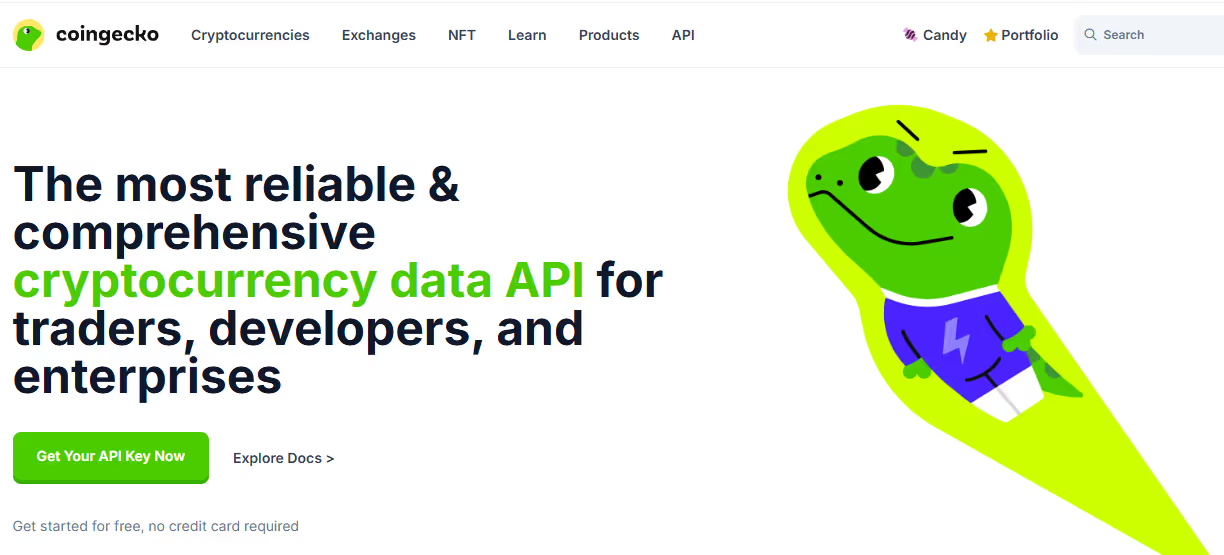
3. CoinMarketCap API
When developing Bitcoin apps, one of the best APIs you can integrate is CoinMarketCap. Data is certified, highly structured, and has a strong historical depth, as CoinMarketCap has been around since 2013. It covers more than 2,000 cryptocurrency assets, as well as social and DEX data.
This network offers two different APIs: a standard one and a DEX API for enhanced queries and usage of decentralized exchange data. In both cases, API integration is relatively simple.
ConMarketCap has some limitations. For instance, free plans are only for personal use, and high uptime (99.9 %) is guaranteed only in professional or enterprise plans.
The standard API offers five paid plans, ranging from 29 USD/mo to customized pricing. The DEX API, for its part, features a free plan that offers up to 1M credit calls per month and an Enterprise plan, with customized pricing.
Major cryptos covered by the CoinMarketCap APIs include Ethereum, Tezos, Dogecoin, Fantom, Litecoin, BNB, Ripple/XRP, Bitcoin Cash, Dash, and, of course, Bitcoin.
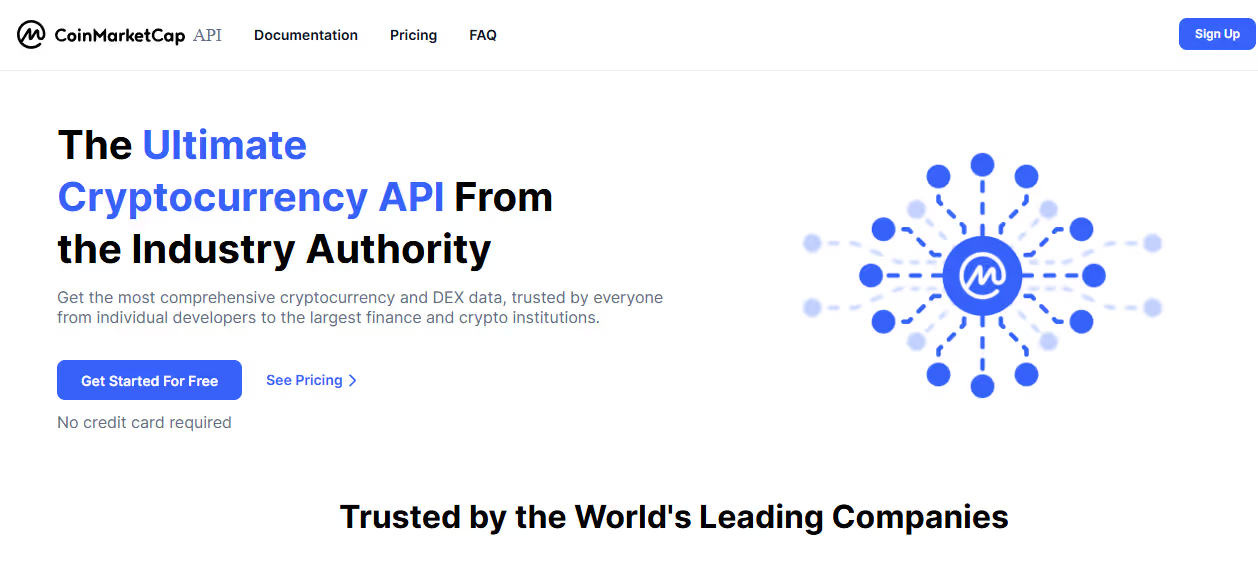
4. Blockchain.com API
Looking for a quality Bitcoin API with a longstanding reputation to integrate with your app? Go for Blockchain.com APIs. Its REST and WebSocket endpoints provide trading and wallet services, as well as direct access to BTC block, transaction, and address info.
Blockchain.com API’s strengths include its capacity to perform direct blockchain queries, and the depth of its historical block/txt data. Its downsides? It can be less developer-friendly than other APIs, lacks live WebSocket notifications, and may have some reliability issues.
This crypto network doesn’t offer different plans and is, in fact, free. Rate limits depend on the type of API you’re using, the data you’re querying, and, for the payment API, on payment methods. This is enforced through API keys.
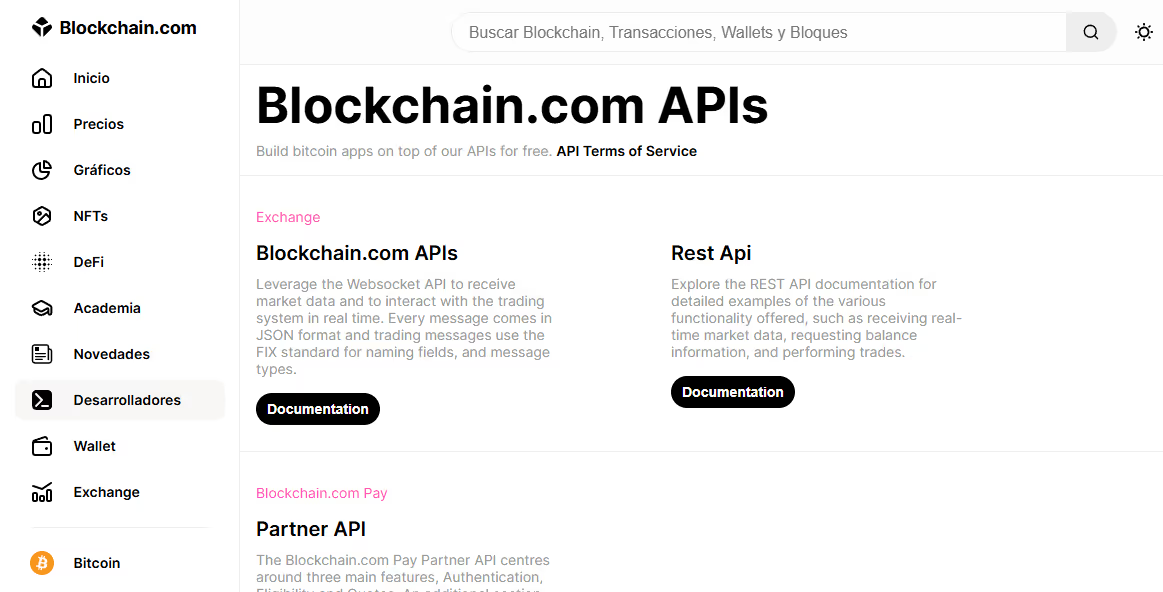
5. BlockCypher API
A developer-friendly cryptocurrency API that includes functionalities such as webhooks, address tracking, push TXs, and provides you with fine-grained data on BTC and other blockchains is BlockCypher.
This API uses WebSocket and REST endpoints, enabling you to request data, automate actions, and interact with several blockchains, including Bitcoin. It stands out thanks to its advanced features, such as multisign, blockchain notifications, and confidence factor metrics.
However, BlockCypher’s free plan has a limited API call rate (1000/day) and doesn’t include email support. While it may suffice for personal projects or tests, if you’re looking to develop an app for commercial use, you’ll need a paid plan.
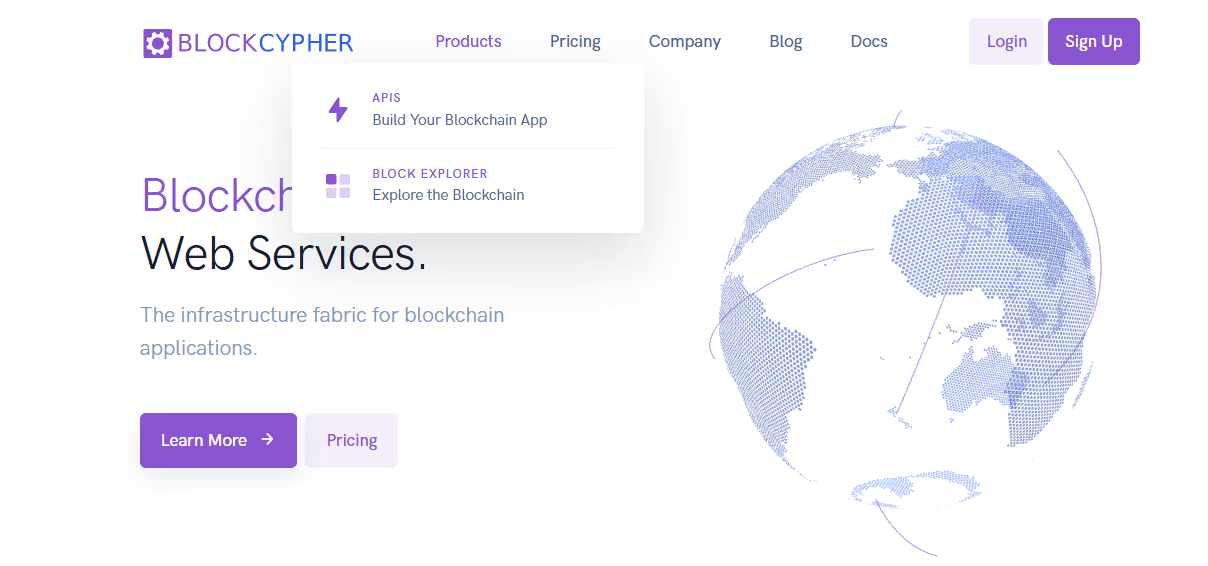
6. Bitquery API
Among the best Bitcoin APIs, you find Bitquery, a powerful software that provides advanced blockchain data, historical and real-time. Bitquery offers various functionalities, including Digital Assets, DEX, NFT, Streaming, Coinpath, and Cloud Solutions APIs. It supports more than 40 blockchains, enabling you to access their metrics and interact with them instantly.
Bitquery offers enterprise-grade reliability, as it parses data within a 500-millisecond latency. Data is properly structured, and the API supports SQL/Kafka/cloud delivery. Unfortunately, its free plan is only for trials, and the learning curve for Bitquery can be steep for most users.
This network has two paid plans: Commercial, and Datashares and Exports. Pricing isn’t listed on the page, as rates are customizable.
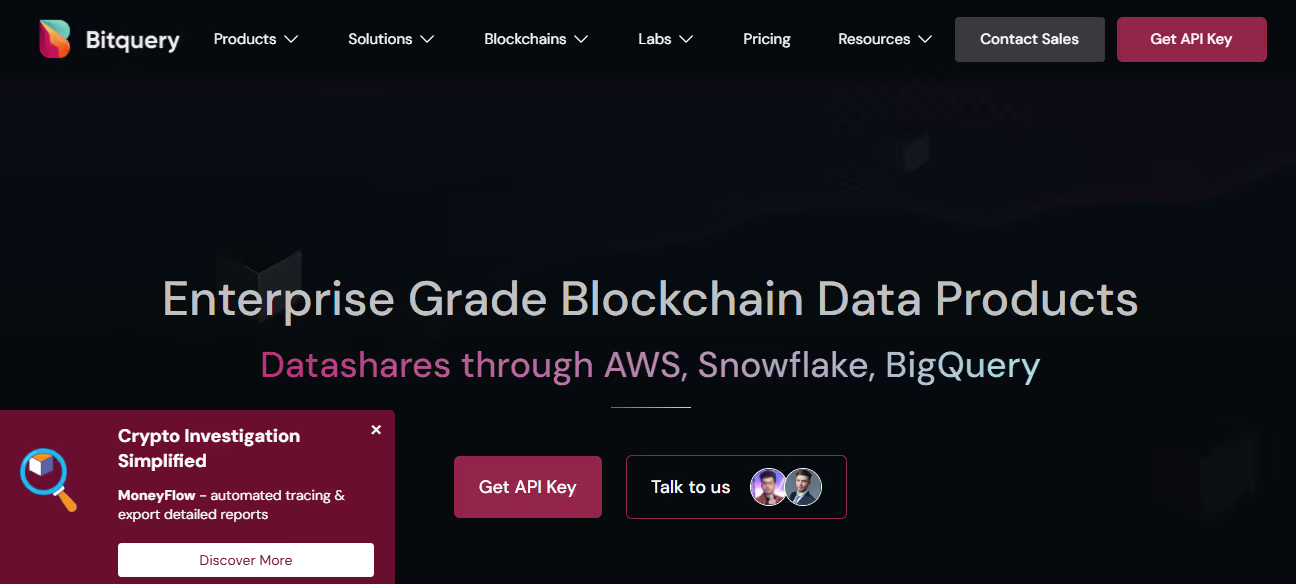
7. CoinAPI.io
CoinAPI.io is a network designed to provide institutional-grade reliability. It features a series of crypto APIs for market data requests, index data, EMS trading, and exchange rates. These offer REST, WebSocket, FIX, flat files, and index-level endpoints, making them ideal for multi-exchange coverage.
This network provides advanced functionalities, specialized for trading desks and fintech firms' engines. Data is unified and updated within sub-100 ms, which makes it ideal for high-frequency trading. Documentation is clear and comprehensive, simplifying integration.
CoinAPI.io has different plans, depending on the API. Most of them feature a pay-as-you-go option, with 25.00 USD free credit, recommended for small teams or ad-hoc users, where scalability isn’t a need. Plans with fixed rates can be significantly costlier if heavy usage is required.
The API covers more than 350 exchanges and thousands of trading pairs. CoinAPI.io provides historical and real-time data, documented and with consistent formats across exchanges, leveraging flexible API protocols, comprehensive market access, and high-performance architecture.
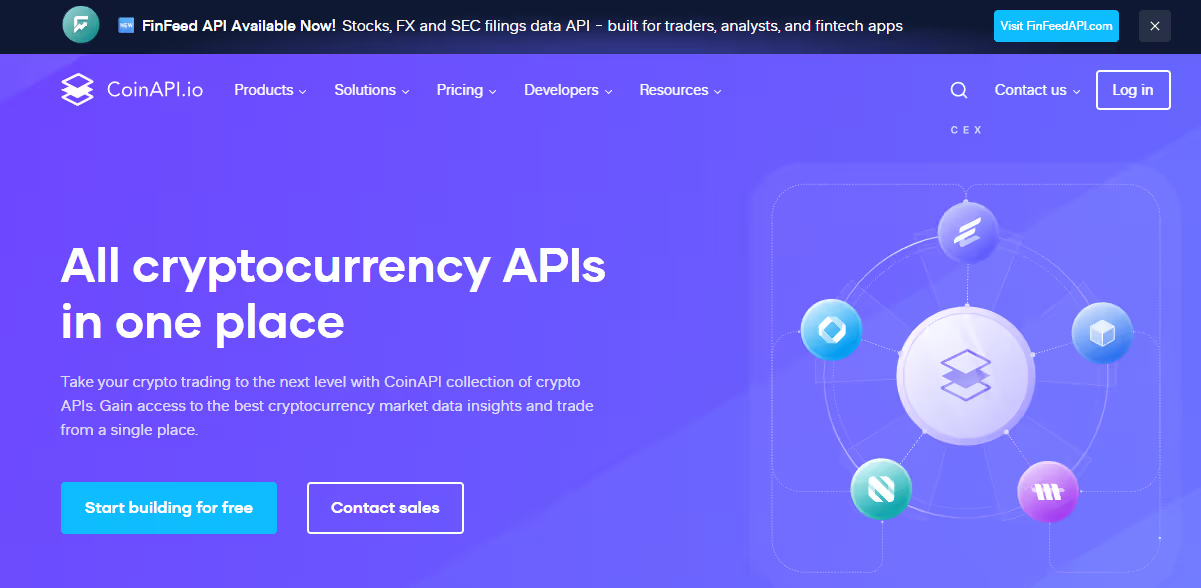
8. BitPay API
Last but not least, one of the best Bitcoin APIs for us, at Abstract, is BitPay. This software is used primarily for wallet creation and management. While it doesn’t provide cryptocurrency data, it processes BTC payments with enterprise-grade reliability, seamlessly handling invoicing, settlements, and exchange rates.
BitPay is developer-friendly and offers 24/7 technical support. It has a tiered pricing structure, with transaction fees as low as 1%, plus a 25¢ fixed fee.
The API supports more than 100 crypto wallets, exchanges, and currencies, including Bitcoin, BTC Cash, Ethereum, Dogecoin, Litecoin, and XRP. Check out the BitPay API documentation to see if it suits your needs.
Although it doesn’t feature the same functionalities as other Bitcoin APIs mentioned in this article, BitPay offers a solid interface for any Bitcoin app needing a reliable payment infrastructure. That said, keep on reading to discover how to finish shaping up your Bitcoin Applications and make the most of them.
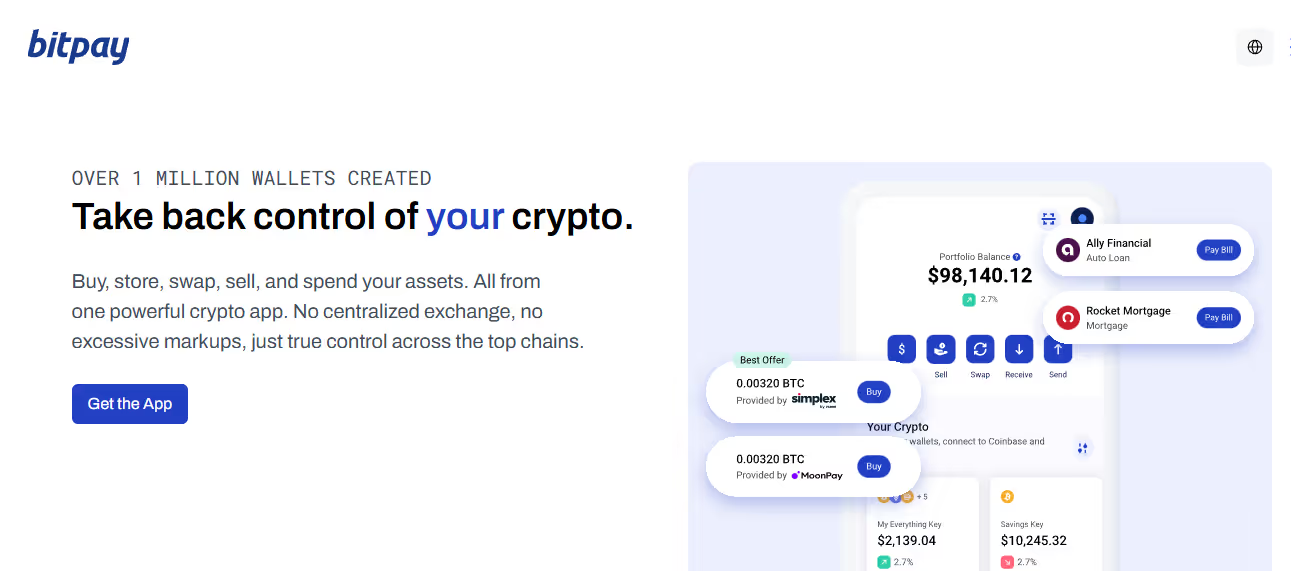
Enhancing Bitcoin Applications with AbstractAPI
Most Bitcoin APIs offer dedicated functionalities. While this enables them to provide high-quality results for crypto-related requests, it prevents them from accurately powering an app by itself.
APIs such as Abstract’s suite complement BTC APIs functionalities to build user-friendly and secure Bitcoin applications. For example, a comprehensive crypto app would leverage a dedicated Bitcoin API to track transactions and manage wallets, and, at the same time:
- Use our Exchange rate and FOREX API to access crypto exchange rate data, convert assets, and feature price alerts and valuation history in fiat terms.
- Strengthen security measures and ensure your app’s users aren’t bots or spam with our Email and Phone Verification APIs.
- Prevent fraudulent procedures, enforce local restrictions, and tailor currency display based on user region by implementing our IP Geolocation software.
- Enhance the user experience by aligning transaction timestamps with user time zones and personalizing avatars, utilizing our Time, Date & Timezone and User Avatar APIs.
- Identify if the user’s email domain belongs to a company and label institutional users or fintech partners, automating KYC/KYB processes with Abstract’s Company Enrichment API.
Bring your apps to the next level. Learn more about our API suite.
Choosing the Right API: Key Considerations
Determining which API is the best largely depends on what you want to use it for. Examining your requirements, as well as potential use cases, may help you cut down the options and find the Bitcoin API your app needs.
To do so, consider the following items:
- Data requirements. Ask yourself which data points you need, as not every cryptocurrency API offers the same information. Some focus on market prices and exchange rates, while others handle blockchain-level data, allowing you to explore transactions, unspent transaction outputs (UTXOs), and blocks.:
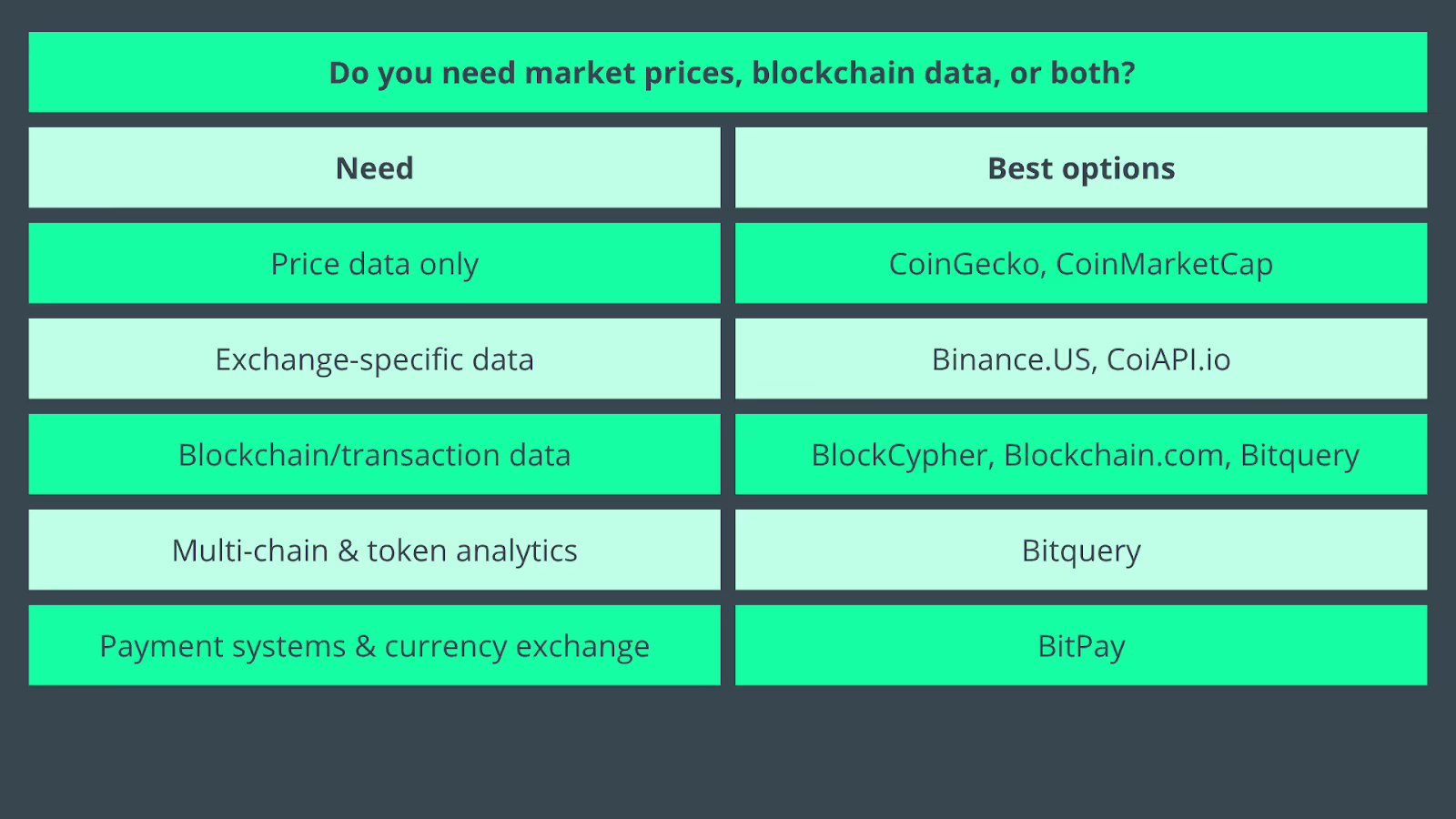
- Real-time needs. How important is real-time data for your application? REST APIs are fine if you’re looking for historical data or don’t need frequent updates. However, wallets, book tracking, or live-prices apps offer better results with WebSocket or webhook support, with low latency levels or cached data.
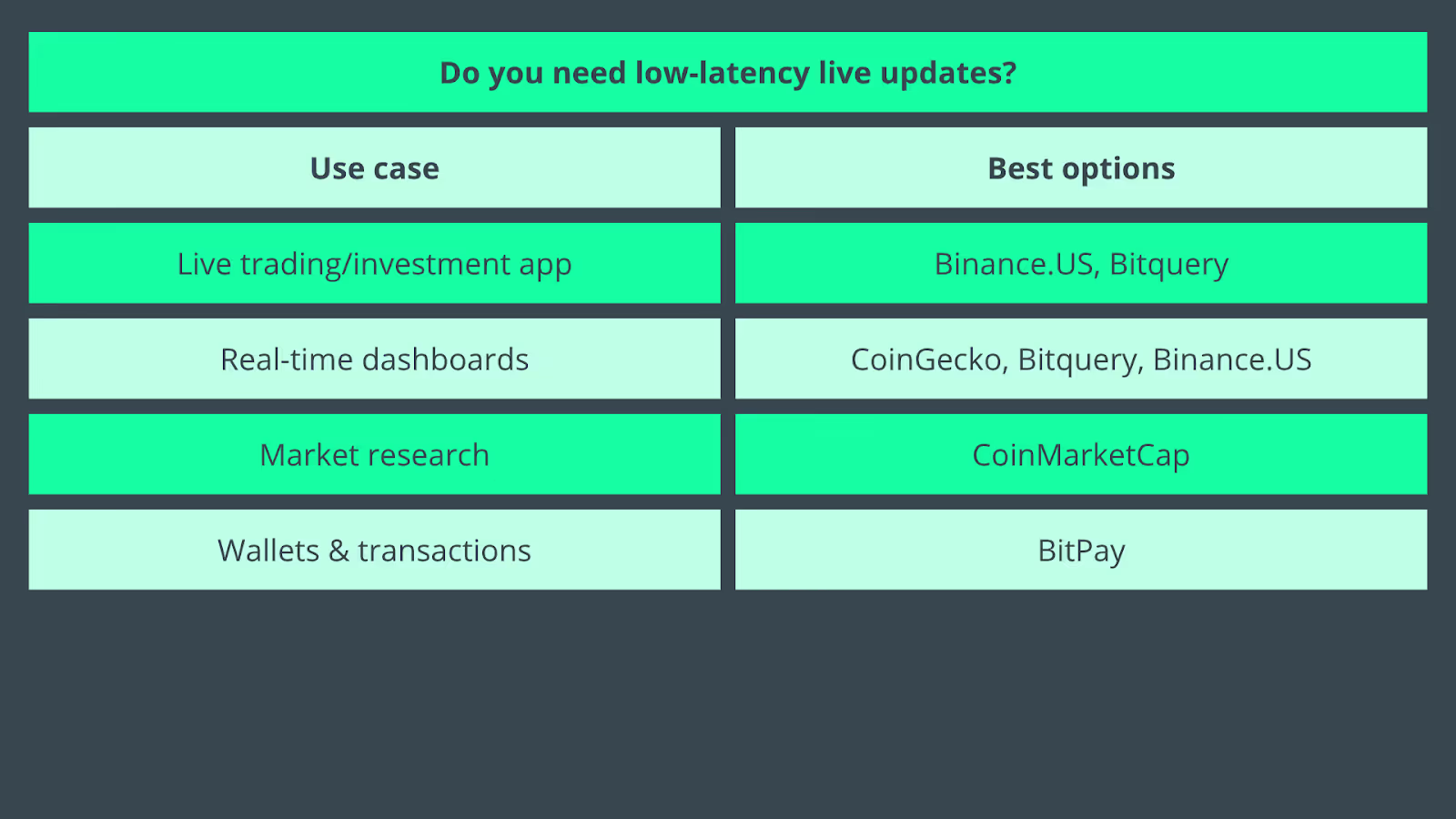
- Scalability. Consider how many requests per second you want your app to handle. Do you expect a high number of users? Choose an API that allows you to expand your call rate seamlessly. Pay-as-you-go plans are suitable for small-scale personal use apps.
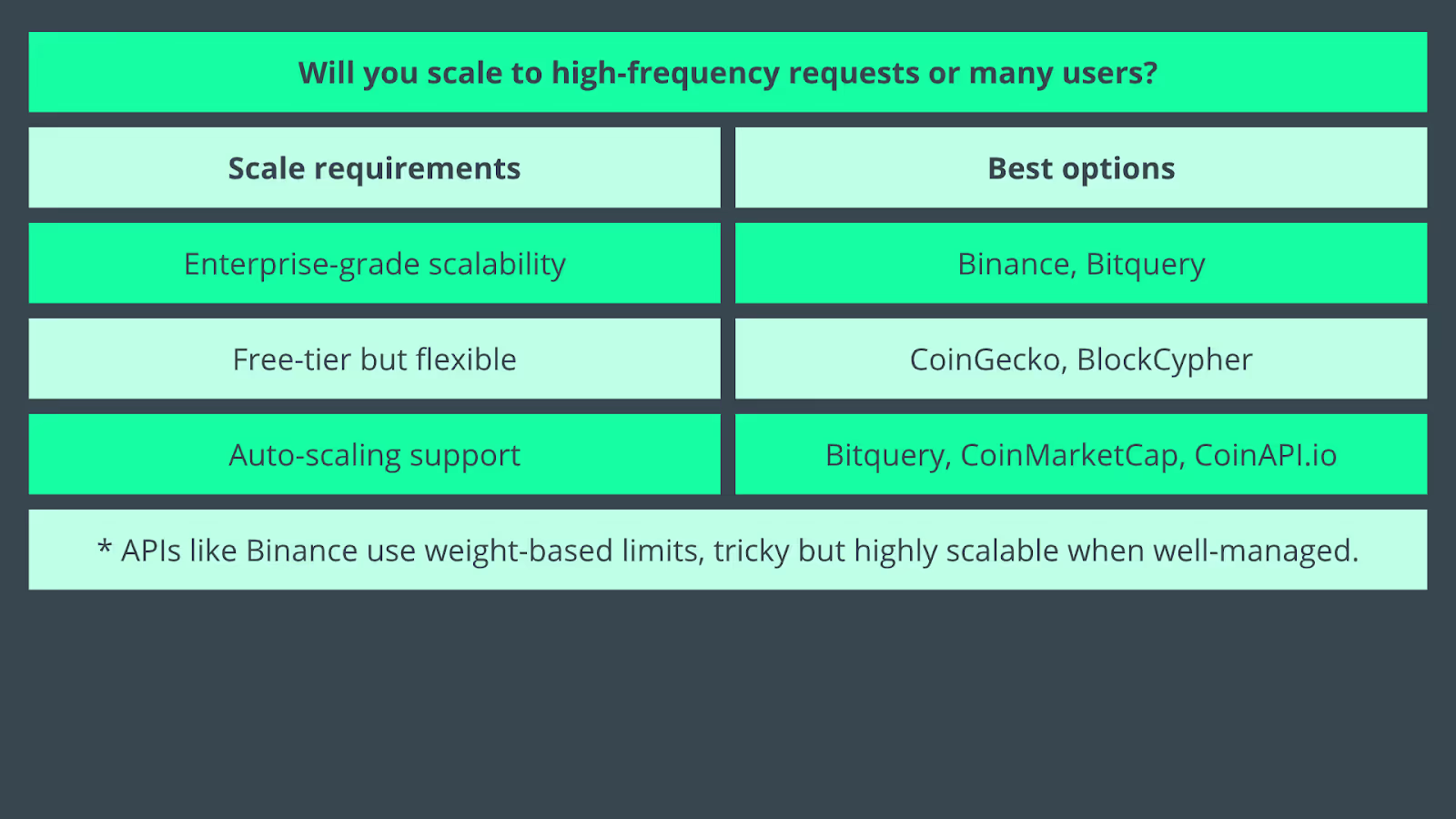
- Security measures. While some Bitcoin APIs exchange public data, APIs handling sensitive data or transactions should support authentication (API keys, OAuth), HTTPS, and have high uptime to prevent security breaches. Additional measures include IP whitelisting, HMAC signatures, or granular key scopes.
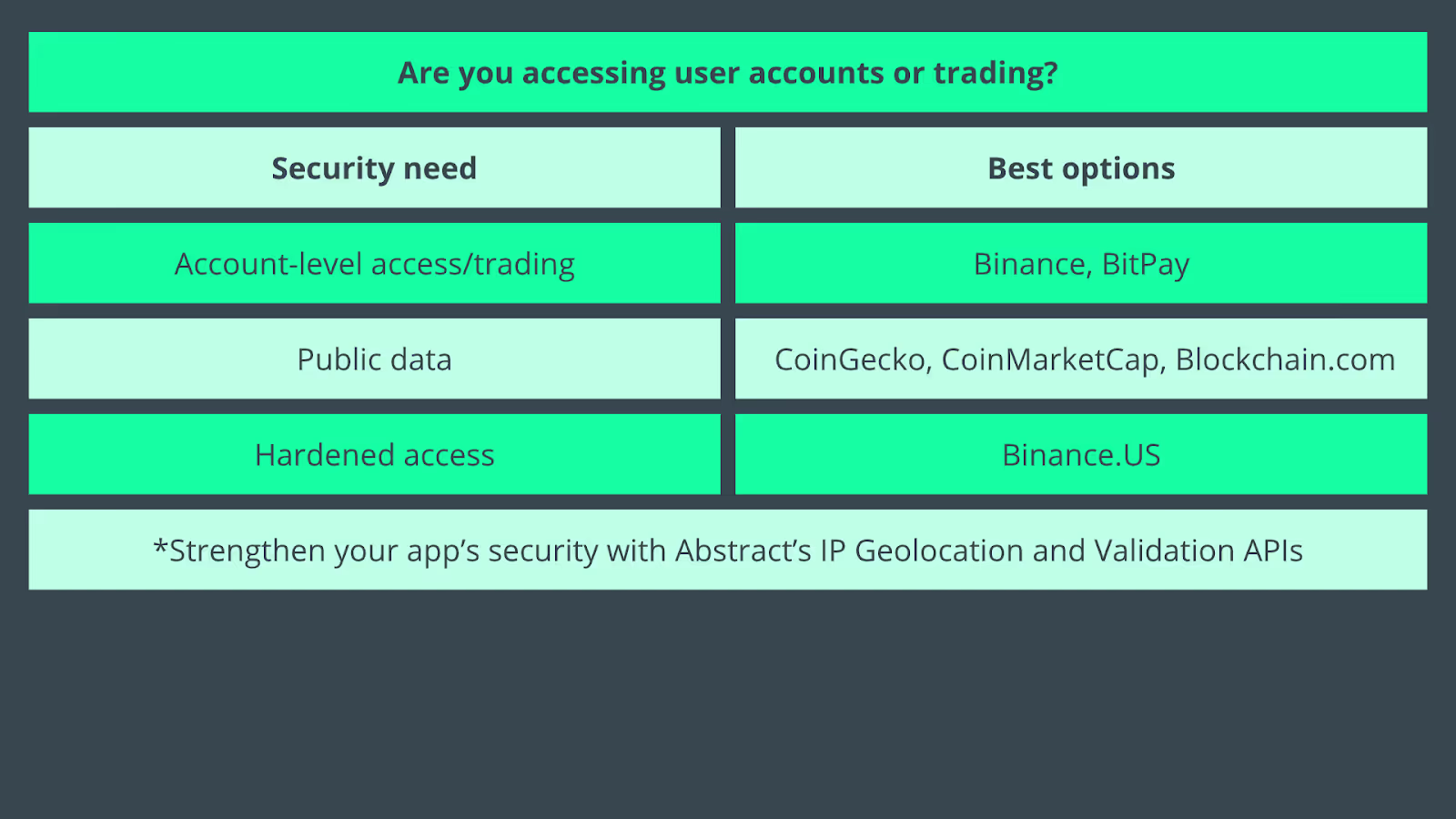
- Budget. Consider your budget for an API subscription before choosing the one. If you’re new to Bitcoin apps, use an API that offers generous free plans to develop and test your app. Once scaling or compliance demands grow, upgrade to pro APIs.
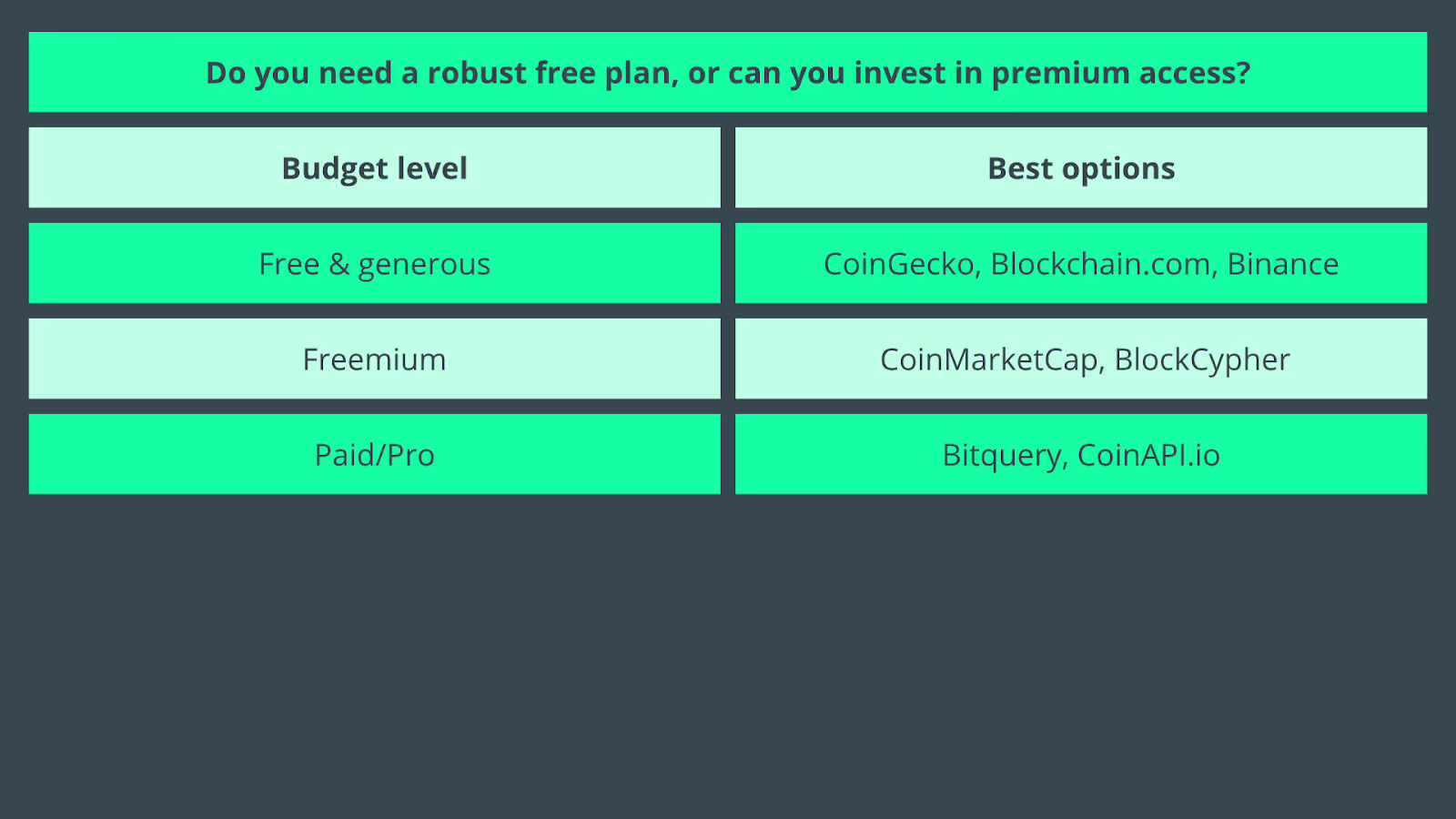
- Interface and ease of use. Ask yourself how easy it is to integrate the API to integrate into your existing system. RESTful API implementation and usage are straightforward. Its design is ideal for wallets and transactional apps.
The GraphQL API interface has a steeper learning curve, but it’s better for data-driven applications. In both cases, try to choose an API with clear, detailed docs and interfaces to save dev time and costs.
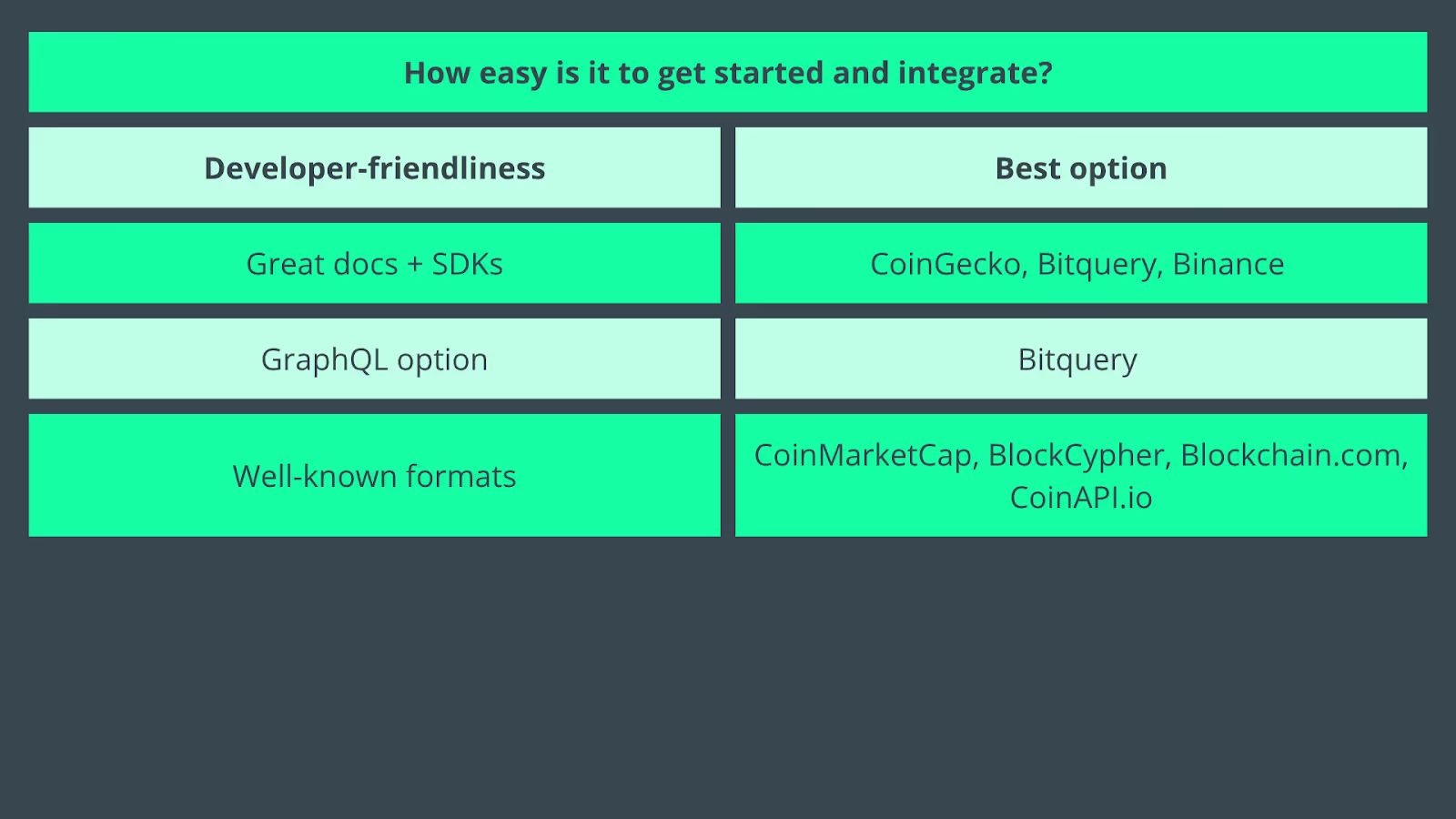
Pricing and Plans
A key factor to consider when selecting the crypto API that’s more suitable for your Bitcoin app is their available plans and pricing.
The plan you choose will determine not only how much you’ll invest but also your app’s scalability and functionalities.
The thumb rule is that higher pricing equals higher rates and more advanced features. Still, some of the best Bitcoin APIs, such as Binance and Blockchain.com, are free, and “moderate” plans tend to be enough for most apps.
Here’s a chart with the plans and prices offered by the BTC APIs mentioned in this article, mid-2025:
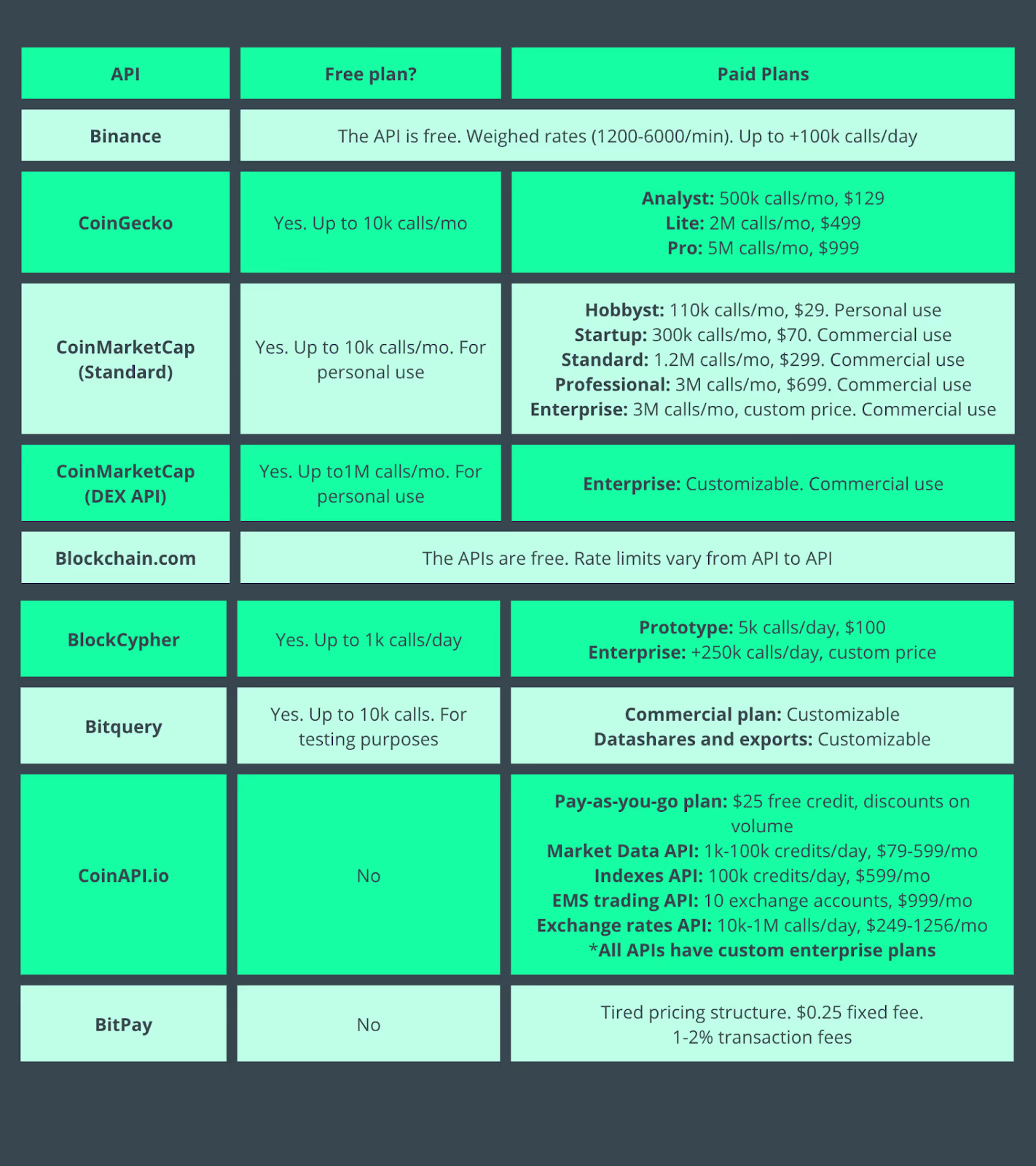
Your Cryptocurrency App, at the Top of Its Game
Choosing the right API for a BTC app is about determining which one offers seamless integration, solid performance, specialized features, and generous rates. All of these, while staying within budget. That’s no small task, but it’s far from impossible.
Now that you’ve reached the end of this guide, you likely have a clearer sense of where to begin. But how to do it? Here’s a final roadmap:
- Think back to the APIs that caught your eye. Start by reviewing their documentation. Consider how closely they align with your app’s goals, your technical needs, and your budget.
- If available, sign up for a free trial account. Use it to power a small prototype or test environment.
- Test the API with a small sample of data. Identify gaps where additional functionality is needed, and seek actionable solutions (for eg, Abstract Validation APIs as additional security measures).
- Repeat this process with your top candidates. Compare their results, pricing, ease of integration, support quality, and data accuracy. If necessary, contact their sales representatives for further insights..
Ready to give it a try? Put your shortlist to the test. Take your app to the next level with a Bitcoin API that is more than just right.



